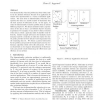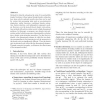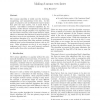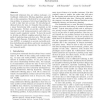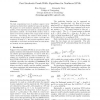SDM
2010
SIAM
15 years 2 months ago
2010
SIAM
The dimensionality reduction problem has been widely studied in the database literature because of its application for concise data representation in a variety of database applica...
132
click to vote
SDM
2010
SIAM
15 years 2 months ago
2010
SIAM
Methods for directly estimating the ratio of two probability density functions without going through density estimation have been actively explored recently since they can be used...
115
click to vote
SDM
2010
SIAM
15 years 2 months ago
2010
SIAM
We present Confidence-based Feature Acquisition (CFA), a novel supervised learning method for acquiring missing feature values when there is missing data at both training and test...
104
click to vote
SDM
2010
SIAM
15 years 2 months ago
2010
SIAM
The k-means algorithm is widely used for clustering, compressing, and summarizing vector data. In this paper, we propose a new acceleration for exact k-means that gives the same a...
122
click to vote
SDM
2010
SIAM
15 years 2 months ago
2010
SIAM
Many sorts of structured data are commonly stored in a multi-relational format of interrelated tables. Under this relational model, exploratory data analysis can be done by using ...
102
click to vote
SDM
2010
SIAM
15 years 2 months ago
2010
SIAM
Real-world relational data are seldom stationary, yet traditional collaborative filtering algorithms generally rely on this assumption. Motivated by our sales prediction problem, ...
102
click to vote
SDM
2010
SIAM
15 years 2 months ago
2010
SIAM
Many approaches to active learning involve periodically training one classifier and choosing data points with the lowest confidence. An alternative approach is to periodically cho...
SDM
2010
SIAM
15 years 2 months ago
2010
SIAM
The high computational cost of nonlinear support vector machines has limited their usability for large-scale problems. We propose two novel stochastic algorithms to tackle this pr...
SDM
2010
SIAM
15 years 2 months ago
2010
SIAM
In recent years, matrix approximation for missing value prediction has emerged as an important problem in a variety of domains such as recommendation systems, e-commerce and onlin...
103
click to vote
SDM
2010
SIAM
15 years 2 months ago
2010
SIAM
We describe a novel semi-supervised method called WordCodebook Learning (WCL), and apply it to the task of bionamed entity recognition (bioNER). Typical bioNER systems can be seen...
